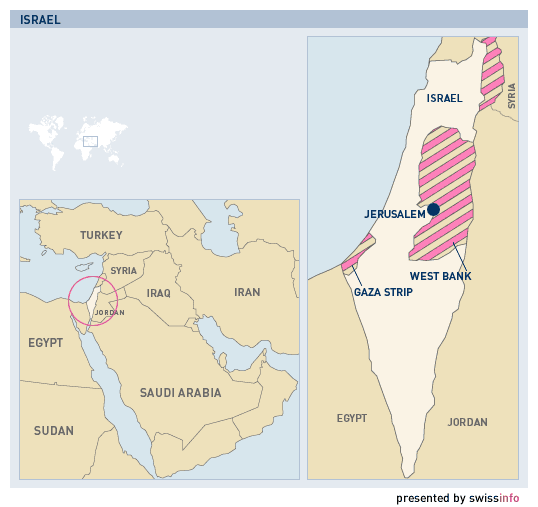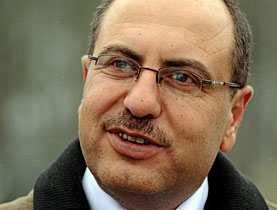Air strikes stretch Gaza hospitals to limits

A weekend of Israeli air strikes has left Gaza hospitals in a state of chaos, the Swiss-run International Committee of the Red Cross (ICRC) says.
Strikes by Israeli forces have killed at least 300 people and left more than 950 wounded since Saturday, according to Palestinian officials.
The Geneva-based ICRC said the influx of casualties had put a tremendous strain on Gaza’s already overburdened hospitals, which are in “dire need” of medical equipment.
Stocks of supplies and medicines were already severely depleted as a result of Israel’s blockade of the Gaza Strip.
“The hospitals are coping as best they can. They are absolutely overstretched,” Anne-Sophie Bonefeld of the ICRC in Jerusalem told swissinfo.
“They were in a difficult situation even before this offensive, lacking in some basic medicine, generators broken, medical equipment unable to be repaired. They were not at all equipped to take in this very high number of war wounded.”
“Chaos” reigned in the hospitals, she noted, with people searching for loved ones and emergency rooms overcrowded and ill equipped.
“For the staff working at the hospital it is a difficult situation, they haven’t slept now for a couple of days because of bombardments which are taking place even at night. They are also worried about their families.”
First priority
The ICRC said the first priority was obtaining more medical supplies for hospitals.
On Monday the organisation was continuing to arrange for a shipment of supplies to pass through one of the designated humanitarian aid crossings between Israel and Gaza.
The convoy of eight trucks includes back-up generators for hospitals and 300 units of blood.
Since the attacks began the ICRC has been able to distribute intravenous fluids to two hospitals and surgical kits needed for around 200 casualties.
The Palestinian Red Crescent Society has provided extra staff in hospitals, while workers and volunteers have been helping to evacuate the dead and wounded from damaged or destroyed buildings.
“We are really at an emergency phase now and are trying to meet the most urgent needs as they are right now,” said Bonefeld.
“In the coming days it is absolutely essential that humanitarian assistance gets through into Gaza. In the past ten days even before this offensive it has been quite hard for the ICRC to get anything through. Everything that needs to be imported into Gaza has to have the green light from the Israeli authorities and that can be quite a difficult procedure.”
Israel launched the attacks in response to ongoing rocket barrages fired at Israeli towns from the Palestinian territory.
Most of those killed since Saturday were reportedly members of Hamas forces, though the precise number is not known. The United Nations agency in charge of Palestinian refugees said at least 51 of the dead were civilians.
In Israel, civilians have come under attack from rockets launched from Gaza that have killed two Israelis and injured several others.
In a statement the ICRC called on those involved in the hostilities to exercise restraint, noting that international humanitarian law required them to take all possible precautions to spare the civilian population from the effects of hostilities. Medical facilities and personnel must also be protected.
“Closed military zone”
Israel declared areas around the Gaza Strip a “closed military zone” on Monday, citing the risk from retaliatory Palestinian rocket fire. A military spokesman said the new policy meant that civilians, including journalists, could be barred from a buffer zone of two to four kilometres from Gaza.
Speaking to a special session of parliament, Israeli Defence Minister Ehud Barak said the country was engaged in a “war to the bitter end” against Hamas in Gaza.
The air assault Israel launched on Saturday was aimed not at Gaza’s residents but at the territory’s Hamas rulers, he said, adding that the operation’s goal was to force Hamas to stop its “hostile actions” directed at Israeli civilians.
The operation would continue and even intensify, he told parliament.
Chief Palestinian negotiator Ahmed Qurie said United States-backed peace talks with Israel had been put on hold.
“There are no negotiations and there is no way there could be negotiations while there are attacks against us,” Qurie said.
Reaction
On Monday Israeli and Palestinian organisations in Switzerland reacted to the attacks in Gaza.
Green parliamentarian Daniel Vischer, who is president of the Swiss Palestine Association, demanded the Swiss government make an unequivocal protest against the Israeli strikes. He added that in the case of a land offensive Bern should “threaten the withdrawal of diplomatic relations”.
Herbert Winter, head of the Swiss Association of Jewish Communities, regretted the many casualties on both sides but said he could understand why, having been under fire for months, the Israeli government took counter-measures.
On Saturday the Swiss foreign ministry acknowledged that Israel had a right to protect itself but condemned the attacks on Gaza City as “disproportionate”. It also called for a ceasefire from all sides and for humanitarian supplies to be allowed into the blockaded area immediately.
“I ask myself what would have been proportionate in this situation,” Winter said.
swissinfo, Jessica Dacey
Five Swiss citizens – Henry Dunant, Guillaume-Henri Dufour, Gustave Moynier, Louis Appia and Théodore Maunoir – founded the ICRC in 1863.
It works mainly to protect the victims of armed conflict and internal violence by providing humanitarian assistance and conducting prisoner of war visits.
It monitors compliance of the Geneva Conventions, which outline the rules of law in times of war and occupation, including the treatment of prisoners of war. Switzerland is the depositary state of the Geneva Conventions.


In compliance with the JTI standards
More: SWI swissinfo.ch certified by the Journalism Trust Initiative













You can find an overview of ongoing debates with our journalists here . Please join us!
If you want to start a conversation about a topic raised in this article or want to report factual errors, email us at english@swissinfo.ch.